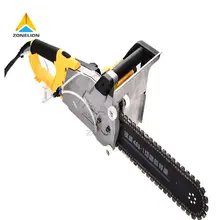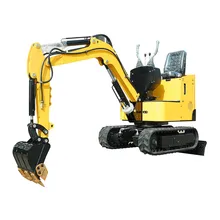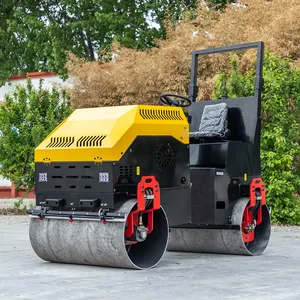What are Road Rollers
Road rollers, also known as roller-compactors or just rollers, are heavy construction machinery used to compact soil, gravel, concrete, or asphalt in the construction of roads and foundations. These machines are essential tools in the construction industry and are also used at landfills and in agriculture. Road rollers work on the principle of applying direct pressure and vibration to increase the density of the materials they are compacting, thereby increasing their stability and load-bearing capacity.
A road roller can be described as a moving compactor. It has a heavy steel drum or drums—often one at the front and one or more at the back—that use their weight and the force of gravity to compress surfaces. Some rollers introduce vibratory motion to enhance compaction, shaking the ground with significant force to pack the material more tightly together. This is particularly useful when working with materials like asphalt that need to be sealed properly to prevent water infiltration which can lead to damage over time.
The users of road rollers typically include construction companies, road building contractors, landscapers, and governmental agencies responsible for maintaining roads and infrastructure. These machines are designed to meet the rigorous demands of construction sites and to withstand challenging environmental conditions. They come in various sizes and specifications to cater to different project requirements, from small walk-behind units for minor repairs and compact spaces to large ride-on rollers for major construction projects.
Types of Road Rollers
The variety of road rollers available is designed to meet specific project needs. Each type comes with distinct features suited for different compaction tasks:
Cylinder Roller: Also known as smooth wheeled rollers, these are the most basic type of road roller. They have one or two large steel drums that roll over the material to be compacted. Cylinder rollers are best suited for flattening surfaces on large, flat areas like roads or sports fields.
Vibratory Roller: This type adds a vibratory action to the rolling process which helps to compact materials more effectively. Vibratory rollers are particularly useful for compacting granular soils or asphalt and are a common sight during road construction.
Tandem Roller: As the name suggests, tandem rollers have two steel drums that work sequentially for uniform compaction. These rollers are typically used for projects that require a smooth finish such as pavements or new roads.
Pneumatic Roller: Featuring rubber tires instead of steel drums, pneumatic rollers provide a more uniform pressure across a wider surface area. They excel at compacting fine-grained soils and hot mix asphalt, especially in the final compaction pass where a more delicate touch is needed.
Sheepfoot Roller: With numerous rectangular-shaped lugs, or 'feet', these rollers achieve deep compaction by focusing force on smaller areas. Sheepfoot rollers are ideal for cohesive or clay soils that require significant manipulation to compact effectively.
How to Choose Road Rollers
Choosing the right road roller requires a careful assessment of your project's needs. The following considerations will help businesses make an informed decision:
Material Type: The kind of material you will be compacting plays a crucial role in selecting a road roller. For cohesive soils like clay, a sheepfoot roller might be necessary, while granular soils may require a smooth drum or vibratory roller.
Project Size: The size of your project determines the size and type of roller needed. A large-scale road construction job will benefit from a tandem vibratory roller's efficiency, whereas a smaller job such as a backyard pathway may only need a walk-behind roller.
Compaction Requirements: Different projects demand varying levels of compaction density. For instance, preparing a foundation for a building requires more stringent compaction standards than creating a gravel pathway.
Maneuverability: In areas with tight turns or obstructions, rollers with high maneuverability like those with articulated steering or smaller walk-behind models may be preferable.
Businesses looking for road rollers should consider their long-term needs as well as immediate project requirements when making their selection.
Best Road Rollers on Alibaba.com
Alibaba.com positions itself as an indispensable resource for businesses seeking reliable road rollers for their construction needs. The platform's vast selection encompasses various types of road rollers suitable for different project scales and material types, ensuring businesses can find machinery that aligns perfectly with their unique requirements.
The global reach of Alibaba.com allows buyers from over 190 countries to access top-tier equipment efficiently and securely. With detailed product descriptions and specifications presented on the website, buyers can make informed decisions without having to navigate through complex industry jargon. Moreover, Alibaba.com's Trade Assurance service provides an additional layer of security by safeguarding payments until delivery is confirmed, giving buyers peace of mind in their transactions.
Furthermore, Alibaba.com simplifies international trade by offering services that facilitate communication in local languages and mobile-friendly buying experiences. The platform's user interface allows buyers to filter through options based on core components like engines and hydraulic systems from reputable brands without being overwhelmed by excessive technical details. Whether it’s for large-scale commercial use or smaller projects requiring precise attention to detail, Alibaba.com connects businesses with suppliers providing customized support such as OEM and ODM services tailored to meet specific needs.
Common FAQs for Road Rollers
What types of road rollers are available for construction projects?
Road rollers come in various types including cylinder rollers, vibratory rollers, tandem rollers, pneumatic rollers, and sheepfoot rollers. Each type serves a specific purpose, from compacting large flat areas to manipulating cohesive soils.
How does a vibratory road roller differ from a traditional smooth drum roller?
A vibratory road roller is equipped with a mechanism that creates vibrations, enhancing the compaction of materials. This is especially effective for granular soils and asphalt. A traditional smooth drum roller relies only on the weight of the drum to compact the material.
Can a single road roller be used for different materials and surfaces?
While some road rollers are versatile, often a specific type of roller is more suited to certain materials and surfaces. For example, pneumatic rollers are better for asphalt compaction, whereas sheepfoot rollers are ideal for cohesive soil compaction.
How does the size of a road roller impact its performance?
The size of a road roller affects its compaction force and efficiency. Larger rollers can cover more area and offer greater compaction force, making them suitable for big projects, while smaller rollers are more maneuverable and better for confined spaces.
What should be considered when selecting a road roller for a project?
When selecting a road roller, consider the material type to be compacted, project size, compaction requirements, maneuverability needs, and long-term usage plans.
Are there road rollers suitable for use in narrow or confined spaces?
Yes, there are smaller walk-behind or remote-controlled road rollers designed for use in narrow or confined spaces where larger machines cannot operate effectively.
What is the purpose of a sheepfoot roller?
A sheepfoot roller is designed to deeply compact cohesive soils like clay by exerting high pressure on small areas through its protruding "feet", achieving desired soil density.
How important is maneuverability in a road roller?
Maneuverability is crucial when working in areas with tight turns or around obstructions. Articulated steering and smaller models offer better control in such environments.
Can road rollers be used in agricultural settings?
Yes, road rollers can also be used in agricultural settings for land leveling and soil compaction to prepare fields for planting or to construct access roads.
What after-sales services can businesses expect when purchasing road rollers?
After-sales services vary by supplier but may include video technical support, online support, field maintenance and repair service, and access to engineers for machinery servicing.
How do hydraulic systems enhance the functionality of a road roller?
Hydraulic systems provide precise control over the compaction process, allowing operators to adjust the force applied and improve the efficiency of the roller's operations.
Why is engine brand important when choosing a road roller?
The engine brand can be indicative of quality, reliability, performance, and ease of service. Well-known brands often have better support networks globally.
What are the benefits of having a high operate efficiency road roller?
High operate efficiency in a road roller leads to faster completion times for projects and can reduce fuel consumption, resulting in lower operating costs.
Do all road rollers come with a machinery test report?
No, not all road rollers come with a machinery test report. It depends on the supplier's practices and standards. A machinery test report can provide assurance of the machine's condition before purchase.
How does compactor design influence the effectiveness of a road roller?
Compactor design influences how well the machine can navigate over various terrains and how effectively it can compact different surfaces. Compact design can also be beneficial for transportation and storage purposes.
































 浙公网安备 33010002000092号
浙公网安备 33010002000092号 浙B2-20120091-4
浙B2-20120091-4